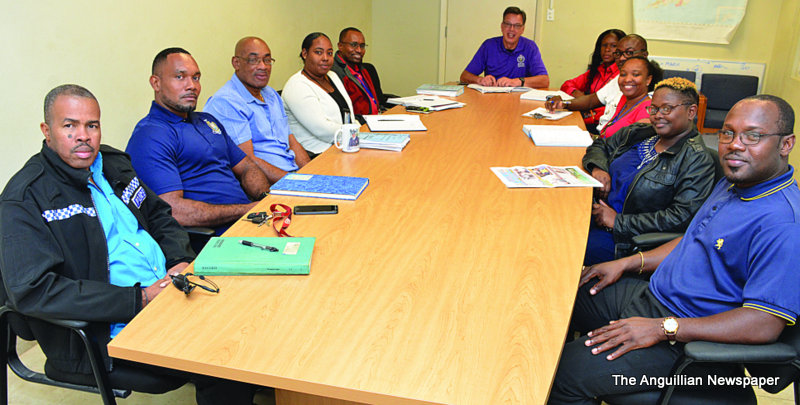
With colourful crime charts projected onto the wall in front of them, and largely wearing lumber jacks in their chilly air-conditioned conference room, division heads of the Royal Anguilla Police Force meticulously examined the January 2020 crime statistics on Friday, February 14.
There, the presenter, Sergeant Kevin Edwards, not only showed a list of various crimes committed at the beginning of the year. He also delivered a comprehensive narration of his findings, interspersed with comments from Commissioner Paul Morrison and other senior members of the Force.
The Anguillian was permitted to sit in on the presentation called “Comparative Statistics” (COMPSTAT) following which Commissioner Morrison told the newspaper: “ We have a Corporate Development Department which is responsible for overall crime performance standards in terms of polices – and checking those policies against operations. There has always been a big push to create accurate crime data and separate crime reports from incident reports because, historically, it seems that many crimes were being lost in incident reports. Therefore, there was a sort of mis-recording of what you are actually facing so, if you want to reduce crime you must have the figures to know if it goes up or down.
“It took a very long time to do the training, write the policy, get it in place, make changes to the way we operated our data – and write the rules around measuring crime. That was from 2017 going into 2018, and we were happy that towards the end of 2018, and throughout 2019, we were producing good accurate data – and that’s the sort of history why we have this meeting.”
Commissioner Morrison continued: “First of all, I must apologise that no one was in uniform because we always have a dress-down on Fridays. The meeting is either chaired by the Commissioner or the Deputy Commissioner; the Superintendent or Heads of the respective units; and then everybody else in the Force is invited as an audience and to ask questions. What is being gauged at the meeting is an understanding of the performance data from those who are accountable for using that data to make decisions.”
Asked to comment on Sergeant Edwards’ report, the Commissioner remarked: “It is yet early in the year. I think the reassuring factor is that the crime data still shows a downward trend which is encouraging – although there were 12 crimes difference [this year] in terms of last year. Those are attributed to just two incidents where multi-charges were laid with respect to the investigation of those incidents. It breaks even with last year in terms of the reduction of serious crime – although we have had three very high-profile incidents with the death of Mr. Vanterpool, the shooting in Island Harbour, and now the murder in Blowing Point. Overall, serious crime is slightly down. It is early days in the year, and you won’t really start to get a sense of how the year will play out until you really get in the month of March or April.
“But the purpose of these meetings is also to look at some initial actions because this year we are targeting domestic violence where assaults take place…We are looking to take more positive action in respect of domestic violence incidents where the risk of harm is quite high – and to reassure victims that we will take action.”
Meanwhile, the Commissioner stated that there were three shootings on the island in less than six weeks. “Gun crime will remain the number one priority for the Royal Anguilla Police Force,” he stressed. “We will be reviewing the tactics that are necessary in order to deter persons from carrying and using illegal firearms. You can never be complacent with gun crime. The porous border and free movement of persons between Anguilla and St. Martin/St. Maarten, outside of regulated ports, pose significant problems for security services.”
Mr. Morrison disclosed that, at the beginning of March, the Royal Anguilla Police Force will be hosting a meeting of law enforcement officials from French St. Maarten, Dutch St. Maarten as well as from St. Kitts-Nevis and the British Virgin Islands which are now part of the discussion grouping. “It is a lot bigger, and more productive, meeting with a real desire to share fast-time intelligence and to target persons who exploit national boundaries to commit crime,” he said. “We are very much committed to that. We realise that our countries are all inter-linked with the movement of people, some of them with criminal intent. It is about trying to join up to make that harder and harder for criminals.”








